
Letter From The Executive Director
Dr. Robert M. Panoff
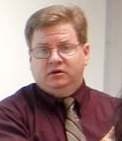
A New Year, a New Decade, a New Expansion!
"Time flies when you are having fun," as the old saying goes, and Shodor staff, students, and colleagues must be having lots of fun because the time has really flown by!
It feels like only yesterday, but a full decade has elapsed since the National Science Foundation evaluated our faculty workshops and encouraged Shodor to transform its regional workshops to become the National Computational Science Institute, and now we have reached thousands of faculty and teachers around the country with the best in professional development. We'll be doing even more faculty/teacher workshops in 2011 as we partner with Sigma Xi, the new XSEDE program from the NSF, and we continue our work with TeraGrid and Blue Waters.
It hardly seems that half a decade ago we were moving to a new office and beginning to transform our on-line materials into the Computational Science Education Reference Desk, a Pathway Portal of the National Science Digital Library. Now we get upwards to 4 million page views a month and are experiencing a 30% year-to-year growth. Of great importance, we ended this year with the first issue of the Journal of Computational Science Education that will now offer professional recognition as a peer-reviewed publication to those advancing the work of computational thinking and computational science.
Time has passed so quickly since the world was preparing for a new millennium, and the Y2K design flaw had everyone worrying how they would be able to afford to update all of their databases from 2-digit years to 4-digit years. Now we are entering the second decade of that new millennium faced with a greater challenge as new media devices bordering between fad and fantastic require us to re-write nearly all of the good work we've accomplished "just" to run on iPads and other tablets that have been slow to allow Java-based materials -including Shodor's award-winning Interactivate and MASTER Tools from running at all. We have two teams of staff and students addressing this, and we promise you that by this time next year, one way or another we'll have a fully implemented solution.
And not that long ago, a student would have no choice but to travel to Shodor's offices in Durham to participate in workshops in computational science, interactive computing, and dynamic web design and graphics. With the help of a new NSF grant, we'll be starting to ensure that students across North Carolina -at least- will be able to have a substantially similar learning experience using the best of Shodor's computational thinking explorations. We're counting on the continued advice, encouragement and support of so many of you, and I take this moment to thank you in advance for what will be a momentous year in Shodor's history of service to education.
All the best,

Bob Panoff
Shodor Spring Saturday Explorations
BY Maya Gouw, Shodor Intern

In the Spring of 2011, Saturday Exploration Workshops will return to Shodor. Although a little different than the previous sessions, once again, students will be given an important opportunity to learn, enhance, and further broaden their horizon of web and graphic design. Through a formed partnership, these sessions are to be held at North Carolina Central University (NCCU).
Exploration workshops will be held on the following Saturdays from 9am to noon: February 5th, 12th, 19th, 26th, and March 5th and 12th of Spring 2011. Topics such as math, physics, chemistry, environmental science, and geospatial science will be covered in these workshops. However, please note the NCCU schedule is still subject to change.
Diving deeper into math and science, during the physics workshop, students will learn the purposes and functions of electricity and capacitors, as well as how they link to everyday life. At the chemistry workshops, the advanced aspects and steps of the scientific method will be revealed to workshop participants. In the environmental, Earth, and geospatial science workshops students will learn the basics and fundamentals of hurricane prediction, tsunami activity tracking, blizzard forecasting and other topics relating to the Earth and its environment.
Shodor fully endorses learning in all seasons. Those who are interested in registering for Shodor's Spring Exploration Workshops may visit our website for more information.
Shodor Announces Expansion of Computing MATTERS

Since its inception in 1994, Shodor has been offering workshops, apprenticeships, and internships to students in and around the Durham area. Through new partnerships with local and regional organizations as well as continued support from the community, Shodor is now able to focus on and expand the Computing MATTERS program. Computing MATTERS is a coherent continuum of other-than-schooltime activities offered to students, upper elementary through college, in order to initiate encounters with the excitement of discovery, the power of inquiry, and the joy of learning enabled by cyberinfrastructure technologies.
Computing MATTERS leverages Shodor's tested and proven model that combines training of teachers and near-peer exploration leaders, effective STEM education experiences for students at all levels, advancement of students from diverse backgrounds to positions of leadership, and continuous mentoring. Computing MATTERS is also designed to help others become adept in computational science explorations, adapt Shodor's materials and approach for their own circumstances, and therefore move to adopt Computing MATTERS as the organizing principle for their own extensive youth-based programs. The general goal of Computing MATTERS is to partner with local communities, providing professional development and ongoing support in order to implement student programs.
Shodor is now working to scale its work by implementing Computing MATTERS far beyond Shodor, serving as a model for dissemination of successful programs. By expanding Computing MATTERS, Shodor is able to facilitate students all over North Carolina, and eventually the nation, in sharing the same growth from excitement to experience to expertise through research opportunities and service as students in Shodor's hometown.
The first step in growing the reach and impact of Computing MATTERS has been for Shodor to create a new, separate, website for the program. This website will serve as a portal of propagation, allowing other programs to search for updates about Shodor, get involved with both the student programs and faculty development aspects of Computing MATTERS, or just gather more information on what Computing MATTERS is.
Please visit www.ComputingMATTERS.org for more information.
To Infinity and Beyond: Students Learn About Fractals
BY Trey Clarke, Shodor Intern
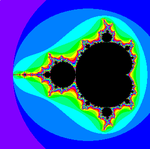
November 11, 2010 is Veterans Day, a day when you would probably find middle school students at home, wasting the day away watching cartoons. However, this year, instead of watching cartoons, 12 students from Durham and the surrounding areas participated in a Shodor workshop, learning about the wonders of fractals.
So what exactly is a Fractal? The term fractal, coined by Benoit Mandelbrot in 1975, refers to objects built using recursion, where some aspect of the limiting object is infinite and another is finite, and where at any iteration, some piece of the object is a scaled down version of the previous iteration. One of the easiest ways of showing students a fractal is by drawing Sierpinski's Triangle. Starting with a Triangle that has been colored in, connect the midpoints of all the sides of the triangle to create a new triangle within the original, then hollow out the new triangle in the center to create three solid triangles. The next stage is to repeat the exact same process to the three solid triangles to make nine solid triangles. This fractal expresses both exponential growth and decay at the same time. As the stages progress, the number of triangles exponentially increases while the length of any one triangle's edge exponentially decreases. This is how one workshop student described what a fractal was, "I learned that they have self-similarity, when the shape is similar to itself." Some of the fractals that were shown in the workshop that occur in nature included ferns, lightning, Romanesco Broccoli, and frost. Even the coastlines of North Carolina appeared somewhat fractal-like.

Over the course of the day, Shodor staff Jenny Jones and Jennifer Houchins worked with the workshop students, informing and teaching them that they aren't just learning about what a fractal is, but they are developing a better understanding and appreciation of the science and math involved in shapes and numbers given by the computer. "We can sit here drawing 700+ triangles for the entire workshop or we can have a computer do it for us and understand why and how it gave us this figure," Dr. Robert Panoff, Shodor's Executive Director, explained to the students as part of the introduction to the workshop.
At the end of the workshop students were asked what they learned that they were most excited about; one student said, "I learned that there is more than just science and math and how they go together somehow. The best thing is that there is more than just math and just fractals."
Apprenticeship Program Still Heart of Shodor
BY Cameron Aviles, Shodor Intern
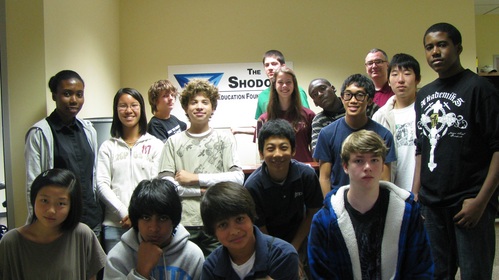
After being at Shodor for over a year now, I have come to realize that the apprenticeship program has been the heart of Shodor's effort to get kids involved in computational science and mathematics. The program not only exposes the students to Shodor itself but also allows them to expand their range of knowledge of how technology can be used in our world. The main goal of the apprenticeship program is to influence students' interest towards science, technology, engineering and mathematics (STEM) to gain the skills they would want and need to pursue a technologically oriented career. Shodor has maintained meeting this goal for five years now not only by getting students involved but also by attracting people from different ethnic backgrounds.
This year's apprenticeship program has 16 inquisitive teenagers from the Raleigh, Durham, and Chapel Hill areas getting experience working with computers. After being exposed to basic modeling, web design and graphics in a wide range of Shodor workshops as well as the Shodor Scholars Program (SSP), apprentices build upon their prior knowledge with Saturday classes usually led by a different staff member each week. The Saturday classes, most recently, have been focusing on modeling and web design. Trey Williams, a senior at Jordan High School in Durham tells us about his experience so far: "I like the apprenticeship program. It's teaching me how to do a lot of new skills that will be useful to me in my future." When asked about his view on modeling Trey says, "Modeling is very interesting, it allows you to model different things like reproduction. We took a scientific concept and made it easier to model." Some apprentices are only able to come in on Saturdays while others also come in during the weekdays. Through this time they have not only gained skills in computational science and math but have also made friendships with each other that will be long lasting.
As for me, the apprenticeship program has given me the opportunity to experience classes in which I picked up skills I thought I would never learn or be capable of doing. As a current Shodor intern I use the knowledge of web development that I picked up as an apprentice and apply it to my current projects. The apprenticeship program experience will be useful to me in the future and, for me Shodor accomplished their goal... The goal to give every Apprentice the skills they need to succeed in the future.
Shodor Partners with DoDDS
BY Paul Kovach, Shodor Intern
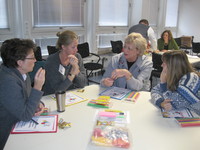
One week in late October, the Heidelberg, Germany Department of Defense Dependents School (DoDDS) played host to teachers from around the area as well as Shodor's own Dr. Robert Panoff. The purpose of this meeting was to introduce educators to the idea of computational thinking and its benefits to mathematics and science education. "The [workshop] participants will have the opportunity to explore mathematical concepts as learners and observe students engaged in actual integrated technology lessons," said workshop organizer, Joy Schiele. The DoDDS-Europe is a subdivision of the Department of Defense Education Activity, a government office concerned with educating children of active duty military personnel and civilian employees on American military bases worldwide.
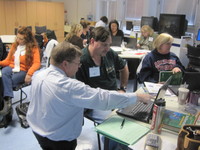
Shodor has a very unique relationship with DoDDS-Europe, having interacted with school districts in Iceland, Italy, and the United Kingdom. However, most of the work has been done with the Heidelberg School District, with which Shodor entered into its first educational contract when DoDDS was interested in enlisting Shodor's help to teach science. After four years of a successful relationship, DoDDS and Shodor extended the scope of DoDDs work to include educating students in mathematics, a decision that brought about the creation of Interactivate, Shodor's extensive repository for math education materials.
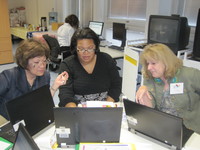
Along with providing online materials that can be accessed worldwide, this set of workshops is an excellent example of Shodor's devotion to bringing the same quality of education to American students worldwide. Already in Germany for an NSDL(The National STEM Digital Library) sponsored trip to HiPoP, a conference on high performance computing, Dr. Panoff offered to extend his trip to include giving three workshops aimed at 3rd and 4th grade teachers as well as middle school math educators. When asked to comment on the workshops, many teachers cited specific activities they planned on using before the end of the current semester; "The fraction finder will serve as an outstanding visual for students who are just beginning the concept of numbers between zero and one," remarked one teacher.
One topic that was covered in each grade level was dynamic interactive computing. Featured in all of the activities in Interactivate, dynamic interactive computing allows students to adjust parameters and in turn analyze the effects of their changes to the problem on which they are working.
This learning through exploration caught the attention of Bill Hatchett, a DoDDS educator who had attended a previous Interactivate workshop series in Germany. "When I first learned of Interactivate, it was a different way to use technology in the math curriculum," says Hatchett. After transferring to DoDDS-Pacific in Korea, Bill continues to utilize the benefits of Interactivate despite his proximity. He even goes as far as to offer his own workshops on using Interactivate in the classroom, a practice that happens worldwide without Shodor's knowledge or involvement.
And for Bill Hatchett, the benefits are clear. "I feel that my classes will perform as well or better than any other class. I know my students have skills from their experiences with Interactivate that others do not."
Professional Development Course Begins This Spring!
This Spring Shodor is offering a Spring professional development course for middle school and high school math, science, and technology teachers. The course, hosted by LearnNC, will explore the myriad of resources available to faculty (for free!) through the National STEM Digital Library (NSDL). Participants will learn to use this collection of resources to find and implement the tools most relevant to their classroom. In individual and group activities participants will learn strategies for searching, self- reflection, and identifying resources. Participants will also review and discuss lessons learned within and throughout the course. In a final culminating project, participants will then take advantage of the resources explored in this online course and create a lesson plan personalized for their uses.
The course begins February 9th 2011 and will last for 6 weeks. Please visit Learn NC to find more information or to register.